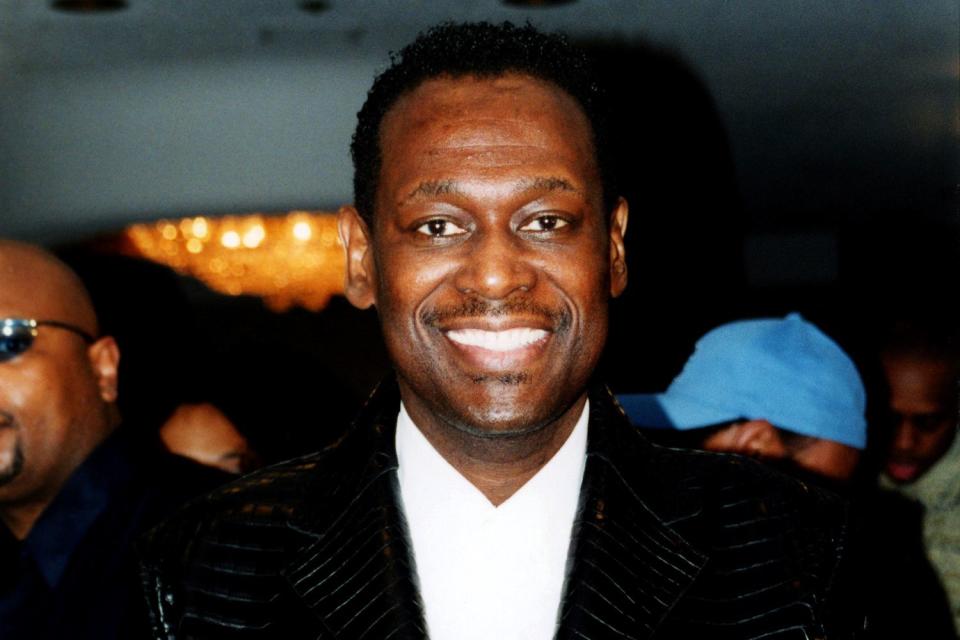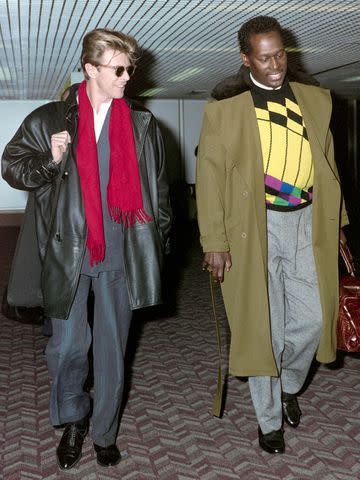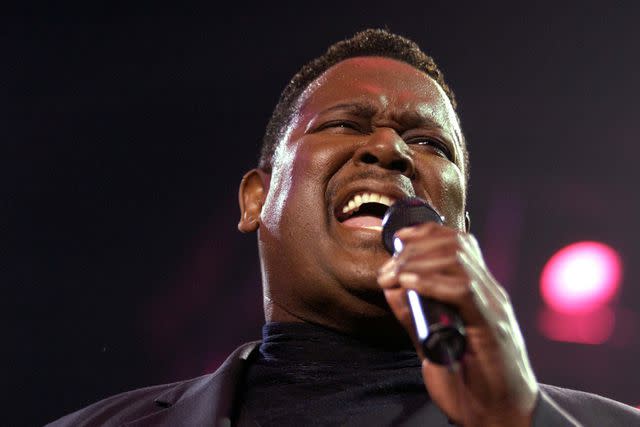Luther Vandross' Response to an Eddie Murphy KFC Joke — Plus More Revelations from the Star's New Documentary
- Oops!Something went wrong.Please try again later.
- Oops!Something went wrong.Please try again later.
'Luther: Never Too Much' premiered Sunday at Sundance Film Festival

Raymond Boyd/Getty
Luther Vandross in Chicago in May 2001Luther Vandross was one of a kind.
In Luther: Never Too Much, which premiered Sunday at Sundance Film Festival, viewers get an inside look at the R&B star's life and career like never before.
The documentary, directed by Dawn Porter, explores the Grammy-winner's passion for music, global rise and sheds light on his personal struggles.
Vandross, who sold over 40 million records worldwide and released 13 platinum albums throughout his career, died in 2005 at 54 due to complications from a 2003 stroke.
From his first run-ins with David Bowie and Bette Midler to his long search for love, here's the biggest revelations from the documentary.
David Bowie was blown away by Vandross' voice

David Parker/Alamy
David Bowie and Luther VandrossIn 1974, Bowie was working on his Young Americans album when he met Vandross in a studio session — and recruited him to sing background vocals.
"I love this guy," Ava Cherry, a background singer, recalls of Bowie's reaction when he first heard Vandross sing.
It was during a session for the song "Young Americans" when Vandross started ad-libbing and Bowie loved what he heard.
"What a breath of fresh air. He had such a fantastic voice that I asked him if he wanted to join in the session and start doing the backing vocals," Bowie said in an interview clip.
In addition to his background vocals, Vandross had a hand in arranging the album. "Fascination" —which ended up on Young Americans — was a Vandross song originally called "Funky Music."
Bette Midler inspired his stage style
In the time that Bowie — who died in 2016 — and Vandross were working together, the "Heroes" singer introduced Vandross to none other than Midler.
They ended up touring together for several years — and she was influential in his stage style.
"She was big on production. So some of my early impressions about what to do onstage were that you should have big, elaborate productions," he said in a clip.
An Eddie Murphy joke lit a fire inside him

Scott Harrison/Getty
Luther VandrossWhen Eddie Murphy made a joke about him being a "Kentucky Fried Chicken-eating motherf---er," in a standup — Vandross had an epic response.
In an archival interview clip, Vandross told a journalist of the joke: "Yeah I love it, I think it's great. You have to know how to play the game."
Then, during one of his shows not too long after, he brought a giant bucket of KFC onstage.
"I didn't want to let Eddie Murphy down," he joked onstage.
"The reason I did this was because I looked on the guest list to see who was coming and I saw Eddie's name. That's when I got the idea. I said, 'We have to address this. This is going to be so funny,'" he said in an interview clip.
Jamie Foxx used Vandross' music to lure in women
Jamie Foxx, who's a producer on the documentary, would use Vandross' music to score with women.
"Back in the day, if you wanted to fall in love, you let Luther do the work for you," he says. "So I would put the phone up to the radio — and what's crazy is you had to wait for it to come on the radio."
He continues, "So I would put the phone up to the radio and say, 'This is what I want to tell you.'"
Turns out, it worked every single time.
After a drastic weightloss, Vandross gained it all back due to a traumatic car accident
Throughout his life, Vandross' weight fluctuated. His lifelong friend Robin Clark says "it was hard for him."
In the documentary, fans get a glimpse at Vandross' drastic weight loss (he lost 126 lbs.), which he credited to self control.
"If the music wasn't sounding right, I ate to cope. Any little excuse that I could use, I would use to eat. I just decided not to do that. I decided that that was not right for me," he said in an interview clip. "I feel better. Onstage I move more. It hasn't affected my voice or my singing at all."

David Corio/ Michael Ochs Archives/Getty
Luther Vandross in London in January 1987In 1986, however, he was involved in a car crash that killed his good friend Lawrence Salvemini in Los Angeles and left him with three broken ribs. He gained all of his weight back in the aftermath.
"It took a toll on him. Food was his medicine, he thought," Clark says.
Later in the documentary, Vandross reveals that he hated the fixation on his weight, which was brought up in every interview he did.
“It’s a personal struggle," he said.
Executives prevented his music from crossing over
Though Vandross had a successful career, he was always fighting to be treated equally with white musicians at his label.
"Luther would only be played on Black radio," Jon Plat, Chairman and CEO of Sony Music Publishing says. "So where it became a challenge was when he wanted to crossover because Luther was not necessarily embraced or given the freedom the same way that other artists that don't look like Luther are."
In an interview clip, Vandross was asked about his thoughts on being pigeon-holed into R&B music.
"There is nothing wrong with adding new fans," he responded. "When you pigeonhole an artist and make them an R&B singer, you are in a certain way doing them a disservice. The point is that I want to add new listeners and reach as many and as varied a group of people — that's been something we've been working on forever."
Richard Marx, one of Vandross' cowriters, says "he knew what was happening."
"He felt very strongly that he was being treated in a racist way from the executives," he adds.
When he finally won a Grammy, however, he made his colleagues call him Luther “Grammy Winner” Vandross for a whole day.
Vandross had an unsuccessful search for love
Despite his ability to make people fall in love with his smooth vocals, Vandross never exactly got the romance he sang about.
“I’m still waiting," Vandross said in an interview clip. "The time that was spent being in love was unfortunately always unrequited."
His song "Any Love" was his favorite because it was the only one that was written completely autobiographically.
"I think because of the stigma back then, if he was gay, the thought of 'coming out,' he couldn't bear it. He'd rather be alone than have that stigma attached," Deborah McDuffie, a commercial producer, said.
When asked about his sexuality in an interview, he kept his answer simple: "I will neither deny or confirm... Mind your f---ing business."
For more People news, make sure to sign up for our newsletter!
Read the original article on People.

